For many land buyers, house demolition is often the first step in creating an environment they love.
However, many buyers will find themselves asking, How Much Does It Cost to Demolish a House? In this article, we will explore the costs and benefits of house demolitions.
Sometimes, those who have experienced natural disasters such as fire or earthquakes are forced into house demolition.
Compared to the typical cost of building a house, it may be less expensive to find a great plot in a good area, destroy a run-down house on the land, and build a home to your specifications rather than seek out the perfect house in the perfect community.
The national average cost of demolishing a house is $18,000. This varies by many factors, such as location, square footage, and any special circumstances (like a fire or natural disaster).
The average cost in the United States for home demolition is between $3,000 and $25,000.
According to Home Advisor, the average cost per square foot ranges from $2 to $17, a broad price range. This is mainly based on the cost of labor in your area.
Almost all house demolition prices start at $4,000 and rise from there, based on square footage.
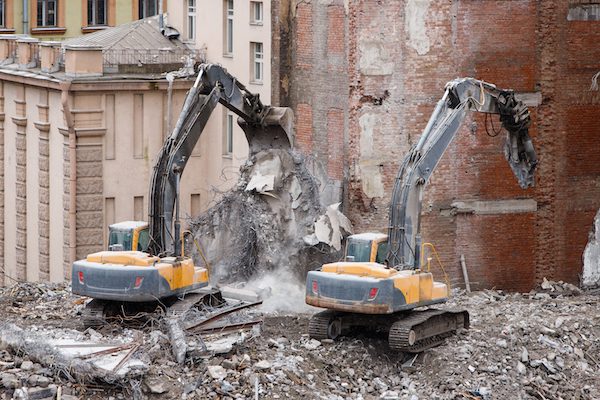
Demolition is the systematic dismantling of a structure by machines.
Workers will demolish the building with hydraulic-equipped machinery additional power and pressure, then fill trucks or dumpsters with the debris and cart it away.
Since salvaging the building is not possible, this is an excellent option for houses in poor condition or those extensively destroyed by fire or weather calamities.
It's also a less expensive choice because, while the cost of the machinery is higher, the machinery does most of the job.
Deconstruction entails removing and saving any elements in the house that can be reused or repurposed- even nails from the floors can often be recovered.
In general, this leads to greater labor expenses. The tax benefit of giving or selling excised pieces of the house can help offset the extra cost of hand-removing elements of the property.
This time-consuming method can cost up to twice as much as pure machine demolition.
This is the environmentally friendly option, as it keeps usable building materials out of landfills and makes them available to people who might not have been able to buy them otherwise.
The demolition of an entire house may appear to be excessive or extreme. It most likely is if you're looking to create a new kitchen or re-do your master bedroom.
However, there are a few instances where complete demolition is a more cost-effective way to get the home you want, so even if demolition seems excessive, it's always worth considering.
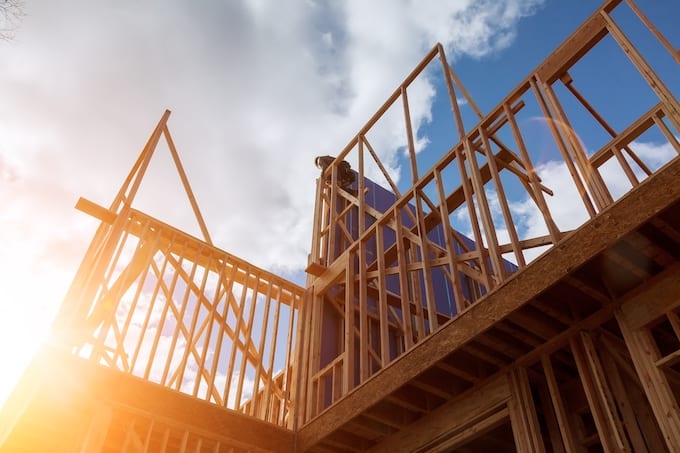
It cannot be easy to acquire suitable land for the intended development.
In some coastal locations or near national parks/protected lands, where rebuilding is permitted, new development is forbidden, there may even be a halt on new construction.
If this is the case, finding a great plot of property with a run-down house on it could be the ideal solution; buy the house to gain the land, demolish the house, and construct the home you desire.
Tip: It is often more cost-effective to buy old properties than to search for the perfect home.
If the house has been condemned or considered uninhabitable, a clever homebuyer can obtain a terrific deal on the house and land.
However, living in such a home is dangerous and may be unlawful. On the other hand, homes that have been damaged may be sold off by the bank for a meager price.
Repairs on houses sold in this manner are typically costly, so the safest option is to destroy and rebuild.
When a house has been damaged or allowed to deteriorate, it is common to assume that repairs are the best alternative.
However, in cases of severe damage, repairs may be more expensive than demolition and rebuilding. Even if the damage isn't significant, it's vital to remember that the house must be brought up to current building requirements when repairs are made.
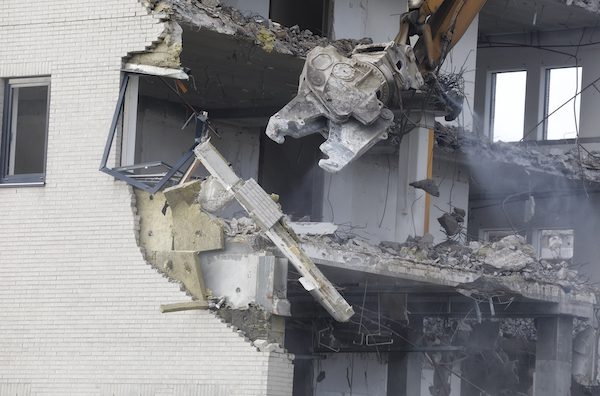
The additional expenditures of improving the electrical and plumbing supplies, removing or abating asbestos, and reconfiguring structural supports in some older homes may be more expensive than starting afresh.
The cost of repairs may surpass the home's value, in which case, demolition and a proper rebuild are the only options for preserving the land value.
At some point in their lives, most homeowners will face a pest infestation. Usually, this will not lead to home demolition, but when severe, it can become serious. A professional exterminator can handle most infestations.
Insect or rodent infestations can get so severe, particularly if a home has been vacant for a long period, that typical extermination is no longer effective. If insects or other pests have overrun the house, a skilled exterminator may advise you to demolish it for safety and sanitary reasons.
It's impossible to deny that house demolition is a big job- and it's not as simple as hiring a wrecking ball and letting it rip.
Everything that goes into constructing a home must be meticulously dismantled and transported elsewhere.
The typical demolition cost is between $3,000 and $25,000, which is a substantial range, and many factors make up the total cost.
Size and construction have a bearing cost of demolition, but other elements like permit requirements are detrimental to consider as you try to gather a budget for your project.
The size and structure of the house can influence the demolition cost. Still, other factors, such as local permission requirements and unforeseen costs linked to building materials in the house, must be factored into the project budget.
The size of the house you're tearing down will have the biggest impact on the project's overall cost.
Larger houses require more time and labor to disassemble since there are more systems to break down and more debris to sort and dispose of.
Related Fact: A 1,200-square-foot house, for example, will cost anything from $4,800 to $18,000 to destroy, while a 3,000-square-foot house will cost anywhere from $12,000 to $45,000.
You'll need to check with your local administration to see what permits your demolition needs. Some towns provide blanket permits, but others require several permits and inspections for various aspects of the project.
Many will require the water, sewer, and gas lines to be capped off before demolition, which will necessitate a professional plumber's services and an inspection to ensure the job is done correctly.
This may have an impact on the demolition schedule, so it's crucial to plan. Other permits may require waste disposal and adherence to safety regulations.
Depending on the availability of a blanket permit, these usually cost between $50 and $100.
A teardown generates a lot of debris that will need to be disposed of. Cleaning can be another considerable cost, depending on how the demolition was done.
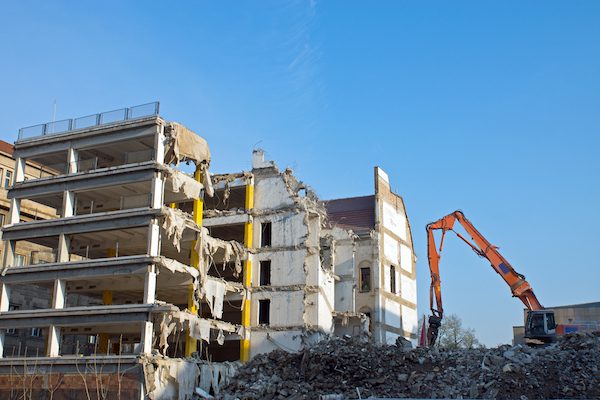
Local cost structures determine dumping fees, but you must also include the cost of dumpsters and hauling fees. Extra disposal fees may apply if you have toxic substances in your house.
The cost of clean-ups and disposal ranges from $300 to $1,800 on average. You may need to hire a hauling team separately in some circumstances, which can add $400 to $600 to your budget for each waste truckload.
Location is also a key factor in determining how much it will cost to demolish a house. For example, the cost of demolition in an East Coast city cannot be compared to that of a tiny hamlet in the Southwest.
Likewise, a house in the countryside will cost significantly less to demolished than a house in a busy city.
In more congested areas, disposal fees tend to be greater. While you might try and negotiate on price, you have no control over your area's current trends and costs. This is especially true when thinking about busy, popular cities like New York, Chicago, or Los Angeles.
The cost of machinery will vary depending on the sort of demolition you choose.
Mechanical demolition, in which heavy machinery performs all the demolition, will increase your budget and reduce labor time by adding machinery expenditures and specialist staff.
Deconstruction of a house, where all interior components are thoroughly dismantled and repurposed or recycled before the structure is demolished, will lower machinery costs.
Still, much higher labor expenses, as the interior's deconstruction is a rigorous interior and time-consuming procedure.
Labor prices vary depending on region and supply and demand ratios. Labor prices will be high during peak construction seasons, regardless of the type of demolition you choose.
Again, this cost is related specifically to geographic location, as many up-and-coming towns will cost more than below-the-radar ones.
Because there is more labor available during the off-season, off-season deadlines will be less expensive, but keep in mind that a lot of deconstruction and demolition work requires trained personnel, which may increase the entire cost.
It's important to remember that demolition refers to the takedown of a single structure or individual components of your house and doesn't necessarily mean the entire structure is destroyed.
Outbuildings and additions to your house can also be removed through demolition. Generally, your cost will vary depending on the total square foot of the structure you would like taken down, along with the job's complexity.
Did You Know: Sometimes, demolishing a single component or structure of a home can be more expensive than you would expect. This is because the level of care required to avoid any damage to the remainder of the house is vital.
You can notice structures you'd like to eliminate when looking at your own home or a potential home purchase.
The tearing down of a portion of a home or an entire outdoor construction is partial demolition. This is a much cheaper option than total demolition if the homeowner is only looking to demolish a few things.
Chimneys have a diverse range of construction, so determining an average cost for chimney demolition is difficult to gauge.
The cost of removing a chimney that extends into the basement or is entirely built into the structure ranges from $4,000 to $10,000.
Furthermore, a chimney that terminates at ground level and is bolted to the structure with hardware is less expensive.
In-ground swimming pools are complicated reinforced structures that demand attention and care in their removal since they must withstand a substantial amount of pressure from inside and outside.
The average cost of removing a pool is $6,500, while exceptionally big or multi-leveled pools might cost up to $19,000. This can be done in two ways: completely removed or partially removed and filled in, depending on the cost.
A ground-level deck is a relatively straightforward demolition and rebuild; the typical cost of removing one is under $30 per square foot, depending on the design.
Elevated deck demolition costs range from $45 to $50 per square foot since they are more complicated and require more planning.
The cost of removing a damaged section of a roof or the complete roof deck ranges from $4 to $5 per square foot or $45 per hour.
The cost may rise if the roof is unusually high, steep, or difficult, or if your local government charges high recycling costs for asphalt. In this case, you will need to pay again for waste removal.
Other options could be re-shingling an old roof that has minimal damage.
Remember: It is crucial to know that installing, repairing, or removing damaged sections of a roof is a fragile project that creates great dangers if not done by a licensed roofing contractor.
The cost of removing the foundation ranges from $1,000 to $5,000. This may appear to be a good price, given that a foundation repair typically costs between $5,000 and $7,000, but you'll have to fill and grade the site to rebuild.
The cracks that form in your driveway over the winter might lead you to believe that breaking them up and removing them would be simple, but this is not the case.
Driveways are multi-layered structures capable of supporting tons of vehicle weight daily. The layers must be broken up and carted away individually so that the site can be leveled replacement.
To answer the question, How Much Does It Cost to Demolish a House? Ensure you have a clear and genuine idea of the size of the project ahead and whether you are ready to take on the demolition process.
Next, you'll have to ask and answer some questions yourself to pick the right contractor. The types of questions you should ask, based on your knowledge of demolitions, are:
Now you can begin to interview potential contractors, but make sure you ask the key questions you should be asking any contractor, such as:
If you consider buying a foreclosed property at your next auction visit, you may be trying to figure out: What Makes Buying A Foreclosed Property Risky?
In this article, we will explore the pros and cons of foreclosed property buying and how you can eliminate those challenges, as well as whom to get in touch with to find a real estate auction.
A foreclosure takes place when a homeowner fails to pay a mortgage or taxes. In this case, real estate goes up for auction or becomes the property of the lending bank or a federal agency.
Foreclosed buildings/homes tend to be underpriced, but carrying out a thorough investment analysis is a key step to ensure you reap full benefits from these homes.
Buying a foreclosed home can provide you with the opportunity to generate a high return on your investment. However, this strategy of home buying produces several risks.
Generally, this is because you may find a long list of unwanted problems if you're not careful enough when carrying out your investment analysis.
If you are reading this article and are in fact facing foreclosure, there are some ways you can avoid this and our detailed guide can help you discover your options.
When a homeowner cannot pay their mortgage and a series of warnings have been issued, the foreclosure process takes effect.
Key Insight: As well as homeowners facing foreclosure, it's possible for homeowners to be sued if they do not follow strict details listed under a Homeowners Association Agreement, such as cleaning sidewalks from snow and ice.
Each lender will have a different policy on how many months you can miss a payment without repercussions. It can be as few as two to three months late.
Though according to the Consumer Financial Protection Bureau, 120 days late is the most common.
If a homeowner surpasses their threshold for late payments, the lender will issue a public notice, referred to as a Notice of Default(NOD). A NOD is a recorded document that states you have failed to pay your mortgage.
After the NOD has been issued, and if there is no record of payments, a notice will be given to you directly warning that you are approaching the foreclosure procedure.
Usually, a grace period is offered, where the homeowner can set up a payment arrangement to pay the amount owed in installments. This is commonly known as the pre-foreclosure process, and if the debt has been fully paid off, the foreclosure process ends.
Unfortunately, if a payment plan can not be negotiated, the house will go up for auction. If nobody buys the property at the end of the auction, the house becomes bank-owned or real-estate owned.
Did You Know: It's possible to stop your property from becoming foreclosed if you contact your lender when you've missed a payment as soon as you possibly can. Avoiding a lender will not diffuse the problem. Being honest is the best way forward.
If the previous homeowner fell behind on mortgage payments, chances are they also could not afford to repair water pipes, termite damage, broken garbage disposals, or anything else.
New owners may face mold problems, roof leaks, a power outage, dead or overgrown grounds, and many other issues.
If you enter a property with mold, it's important that you are alerted to this beforehand. Furthermore, if professionals have entered the house to complete mold remediation this must be disclosed in your paperwork.
Bearing these things in mind, such properties usually lack cleanliness. As they have been unoccupied or empty for a long time, these properties tend to be very messy. In some cases, previous owners intentionally neglect tidiness as they know that they'll have to move out soon.
These small problems can turn into a problem. Lack of basic maintenance makes a foreclosed property almost destroyed. Repair costs might accumulate very fast, so you will have to spend a lot of money to make the house livable.
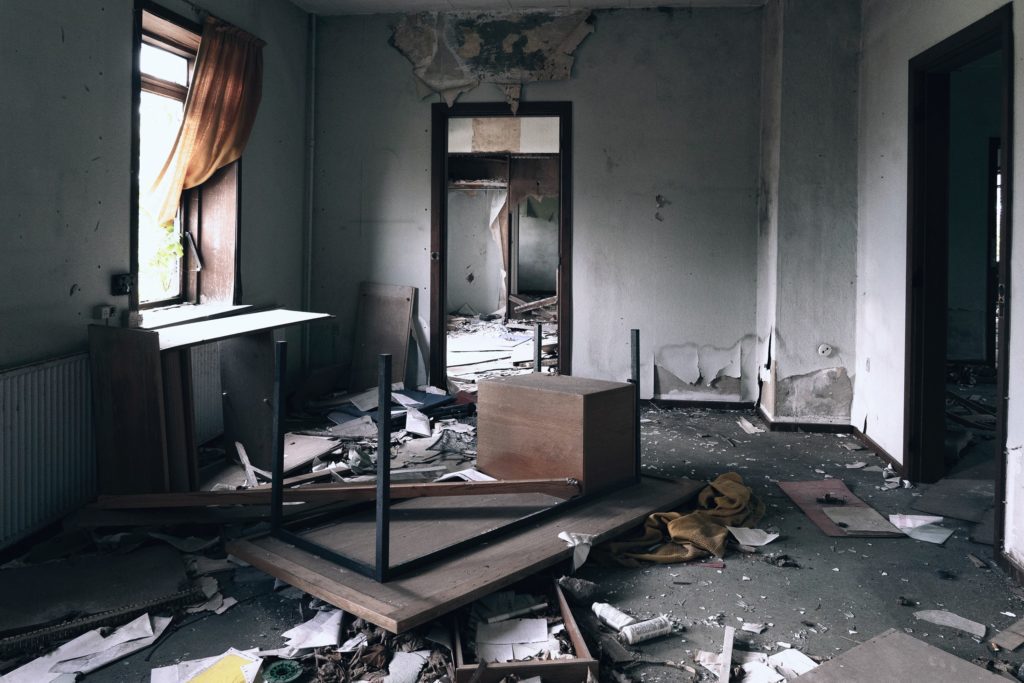
Unfortunately, some people make structural changes without getting the necessary permits.
If the previous owner illegally converted the garage into a living room or installed more windows, it will be your job to deal with the consequences of those actions. Structural changes may not only be unwanted to you but can also create problems with local government officials.
Additionally, there might be partially completed work inside. While some rooms may be redecorated, others may not be updated in decades.
Key Insights: Previous owners may make changes to the property's structure without seeking permission. Once the property is in your hands, you will be responsible for dealing with these issues legally.
One of the biggest and most common factors contributing to what makes buying a foreclosed property risky is overpaying for your property.
Since you never really know the true condition of foreclosed properties, it isn't easy to calculate renovation costs before purchase.
Limited transparency makes it hard to estimate the genuine value of the house with high accuracy. It would help if you were careful because you must cover all past-due taxes after taking ownership. Also, note that back taxes are typical with foreclosures, so your expenses may increase significantly.
Apart from that, the competition at auction can be fierce enough to send the price far higher than it's supposed to be. This is another reason why you can end up overpaying for the property.
Foreclosure sales aren't as fast and smooth as you may wish them to be. Banks sometimes consider many offers so that the buying process may drag out quite a bit. If you have a certain rental strategy, it can be disrupted by time delays. Consequently, your ability to turn around a profit may be negatively affected.
Due to intricate laws governing your region, some foreclosed properties may be significantly delayed from being made available on the market. In some states, the litigation for a foreclosed real estate lasts three months or even more.
When buying a bank-owned property, you also get the title, including any liens placed on it. Unfortunately, they don't vanish after foreclosure, so you may need to deal with debt long after purchasing the house.
As mentioned above, one of the most frequent types of liens you might face is IRS debt. Sometimes, it claims a huge percentage of the resale price, leaving you with a minimal profit or even a loss. However, contractor liens or divorce decrees are also common.
Contractor liens occur when individuals or companies who did renovations or repairs are still owed some amount of money. The decree of divorce may place a lien because of past-due child support or spousal support.
Nowadays, most purchases are made via credit or debit cards via online payment systems. However, foreclosed auctions require you to pay in cash, potentially causing some inconvenience for buyers.
Besides, there is always the risk of the homeowner refusing to move out. Even if you come up with the full purchase price in cash within 30 days, as most auctions require, nobody guarantees that you'll be able to occupy your new home in a month.
Any potential buyer cannot inspect any property that is bought at auction. That means you have no right to enter it and see how it looks inside, meaning you'll never know what problems exist inside or outside of the property and how much it will cost to resolve them.
Even worse, the house might be already occupied by unwelcome inhabitants if it has been vacant for a lengthy period. Sometimes, new owners meet squatters, runaways, or drug addicts in their homes, which can be quite dangerous.
Now that you realize what makes buying a foreclosed property risky, such as vulnerability to damage, vandalism, and different forms of degradation- let's expound on how you can avoid these problems. To mitigate the risks listed above, you should take care of a property inspection.
If you decide to take this responsibility on yourself, you will need to pay the necessary fees. Inspectors will help you to check on the condition of the house you are going to buy. They will also find out if the homeowner still occupies the property.
However, the inspection may miss some defects if they are not obvious. For example, electrical or pipe issues often stay unnoticed.
Therefore, the best way to gauge a foreclosed home is to work with professionals who have enough expertise to assess real value. Contractors or appraisers understand how much costs you will have to spend on construction and remodeling.
Remember: Banks and the Department of Housing and Urban Development always sell homes 'as-is'. In simple terms, this means that the seller does not guarantee that everything in the property is in working condition, and the seller will not repair any damages to the property.
As noted previously, you will not be able to access a property before you become its owner. Unfortunately, potential buyers cannot walk through the property with an agent to evaluate its condition.
So the biggest problem is that you will purchase a house remotely, but as mentioned, property inspections can be carried out by professionals.
The next thing you need to take into account is your available cash. Although each auction has set requirements and payment methods may differ, it would be better to have the cash to secure your bid.
Don't rely on flexibility. Think about money in advance to pay for the property in full just after winning the auction. Otherwise, you can lose a great opportunity.
The main function of title search companies is to ensure that nobody else (contractor liens or a second mortgage) has claims on the foreclosed property.
Additionally, they make sure that the seller pays for everything inside your house, so you won't have to cover the previous owner's debts.
Title insurance gives you a 100% guarantee that all of this research is thorough and legitimate. This guarantee helps to protect you from any unexpected claims that may come up in the future.

The easiest and most reliable way to find foreclosure auctions is by contacting your local government.
If you don't want to call them, you can learn all the needed information from their websites. There are also great online platforms like RealtyTrac.com. Make sure you research thoroughly, as information can be outdated, so be attentive when using them.
If the owner can catch up on missing mortgage payments or come to a certain agreement with their lenders, you won't have a chance to make the desired purchase.
Other valuable sources of information are local brokers and real estate agents. However, they are not usually eager to help you with live auctions because it won't benefit them in any way.
But if you resort to an online auction, you may count on their assistance since they may earn some commissions.
Potential buyers can also use Multiple Listing Service Reports(MLS). MLS data contains all the necessary information you might need, including photos and non-public broker comments that share important facts affecting sale prices. You may get critical information from such comments covers house defects, possible financing options, occupancy, and leases.
Now that you understand 'What Makes Buying A Foreclosed Property Risky?' and you have fully grasped and understood the process, we hope you feel confident to go to auction and embark on a new journey.
Before you place a bid, you must be aware of all the risks you are taking and how you can overcome each to minimize the element of risk.
If unsure, consider working with an experienced real estate agent and use trustworthy tools such as Realty Trac to find foreclosures.
Key Insight: You should always try to request a home inspection before purchasing any property, so no surprises wait for you when you visit your new home.
Be thoughtful while making a purchase and carefully consider all the pros and cons of foreclosed properties before deciding if you want to explore further.
Have you wondered How Much Do Property Managers Earn? To a large extent, a good life is a matter of the decisions we take.
One of the most important decisions every one of us has to make is the career choice. In this article, we will expound on this topic and reveal how much property managers earn.
Because we will be spending most of our lives working, we must find something we really enjoy doing. However, as work will contain most of our lives, we must consider other things besides our feelings toward our future job.
One of them is the expectations we can have in terms of income and career-making opportunities.

To have your first impression of whether this job would be a good fit for you, you surely have some idea what this profession is anyway.
As the word itself suggests, a property manager is in charge of taking care of real estate properties to make sure they meet the conditions required from potential buyers.
Below is a list of only a few tasks of a property manager
It isn't easy to make an approximation on how much do property managers make. The reason for that is that we need to consider a few contextual factors (shown below).
However, one can say that property managers are among the highest-paid employees in the real estate industry.
Overall the annual salary of a property manager ranges approximately between $25,000 and $75,000. Notice, however, that this number is an average. Therefore, if you're a very successful property manager, you can earn more than $100,000 per year (NOTE: this is not the net amount of money you'd collect as we've neglected applied taxes).
Here are averaged annual salary expectations for property managers in different parts of the world.
Commonly, property managers collect their earnings in two ways:
1. Fixed income Employees who are paid this way agree on a fixed amount of money given to them monthly. In this case, their income doesn't depend much on how many real estate properties they sell or rent to clients.
Nevertheless, this is not totally rigid as specific bonuses might still be included, and some minimal quotes must be met.
2. Percentage share per deal Another way of getting paid as a property manager is by agreeing on a percentage share for each rent or seal deal.
If your income lies at the bottom of this limit or up above will depend on several factors that we're going to list below and provide some detailed information to them.
As already mentioned, there is a range of salaries for property managers. Therefore it would be normal for someone to ask what determines income as a property manager.
Overall, there are a few common factors that largely determine how much do property managers earn.
These factors include:
In principle, a high school diploma is sufficient to enter this market. However, academic qualifications and specific training programs are highly valued in the eyes of employers.
Real estate investors and any property owner willing to hire a property manager looking for individuals that have previously undergone necessary academic education.
For them, this is an essential metric of measuring your intellectual capability to understand your role as a property manager and deliver accordingly.
Nowadays, universities maintain close ties with big industry players to ensure that their skills and knowledge align with what the market needs.
In addition, they offer numerous training programs to prepare future property managers for a smooth transition into the job market.
Also, employers rate high your participation in any relevant training programs that conclude with a particular certification.
Therefore, the higher is your education, the higher the expectations for a high salary. However, this has not to be always the case.
Many people hold few qualifications, but they're talented and still manage to generate a huge income as property managers.
Employers prefer persons who have some relevant experience previously so they can trust their job and bring results. Being this much attractive, experienced property managers set higher salary demands.
On the other hand, individuals that are planning to land their entry-level job in this industry, are paid of course, less as it's difficult for employers to trust them.
However, the best thing about property management is that you can climb the ladder fast and generate high incomes.
This might be something you don't have control over, but it still makes a huge difference. The obvious truth is that the global property managing market is not uniform around the world.
As such, your location will largely determine the amount of money you can earn as a property manager.
For instance, property managers in the USA and Western Europe earn more than in other parts of the world. In addition, there are differences at the national level, but they're not that significant.
To illustrate this, let us consider the case of the US state property managing market. The annual salary for property managers in the US differs from one federal state to another.
In general, the range of annual income of property managers in the US extends from around $40,000 to a little over $100,000.
For instance, in Mississippi, you would earn a little over $40,000 per year as a property manager. In contrast, if you would be working in New York, your annual salary could be up to $110,000.
The company you work for: As you would easily imagine, property manager salaries vary from one company to the other.
Leading companies that are well-established in this industry do only work with big real estate investors. As such, they only go for contracts worth hundreds of thousands or millions of dollars.
In turn, this accounts for a higher payment rate for property managers than medium or small property management companies.
Therefore, if you aim to collect more money from your job, a workplace in any of these companies would be your goal. However, keep in mind that it's not that easy to land a job there without proving yourself in this area.
As already mentioned, the national market you're employed into is among the main determining factors of your annual income as a property manager.
The US has the largest and strongest property management. Currently, its worth is estimated to be around $48 billion.
Europe is another region where property managers are paid particularly high. Among European countries, Germany, the UK, and France are proud of having significantly large property management markets.
That said, if you want to earn the most as a property manager, you should try to get a job in any of these regions, in particular the countries mentioned.
Today, globalism is not that hard to switch to another market despite inevitable bureaucratic procedures.
Employers are always open to foreign candidates as well who do excel with their CVs.
Therefore if you already have enough experience and want to find a higher-paid position as a property manager elsewhere, you can easily apply for vacant positions abroad.
A fixed monthly or annual income is not the only source of income for a property manager. Usually, property managers earn additional bonuses on top of their regular wages.
Typically, there are no average estimates or any common standard for how much these bonuses actually are.
However, you can expect between 5 to 10% of a signed deal to account for extra earnings. In principle, this will vary according to your job's contract details and deal terms with your client.
For instance, if you manage to sell or rent a real estate unit that the owner was particularly struggling to succeed with, you can expect relatively high bonuses.
In addition, if you meet certain annual targets set by your company, you'll collect a specific percentage share for every deal beyond it.
Finding a job, you like doing and generating a high income is very important. However, the future perspective of it is equally that important.
Many jobs are highly demanded at times but very unstable in the long term. When you pick up a job for yourself, you always want to make sure that it has some potential to maintain its relevance for enough time in the future.
Fortunately, the market for property managers is one of the most stable and largest real estate sectors. Based on some reliable data, the property management market will grow up to about 22 billion dollars by 2023.
Also, the US market will account for most of this growth.
Even if we ignore numbers, it is obvious that investors and property owners will always need to rely on professional individuals who can bring the highest profit from their property.
Thus if you decide to make a career in this industry, you can expect a quite bright future.